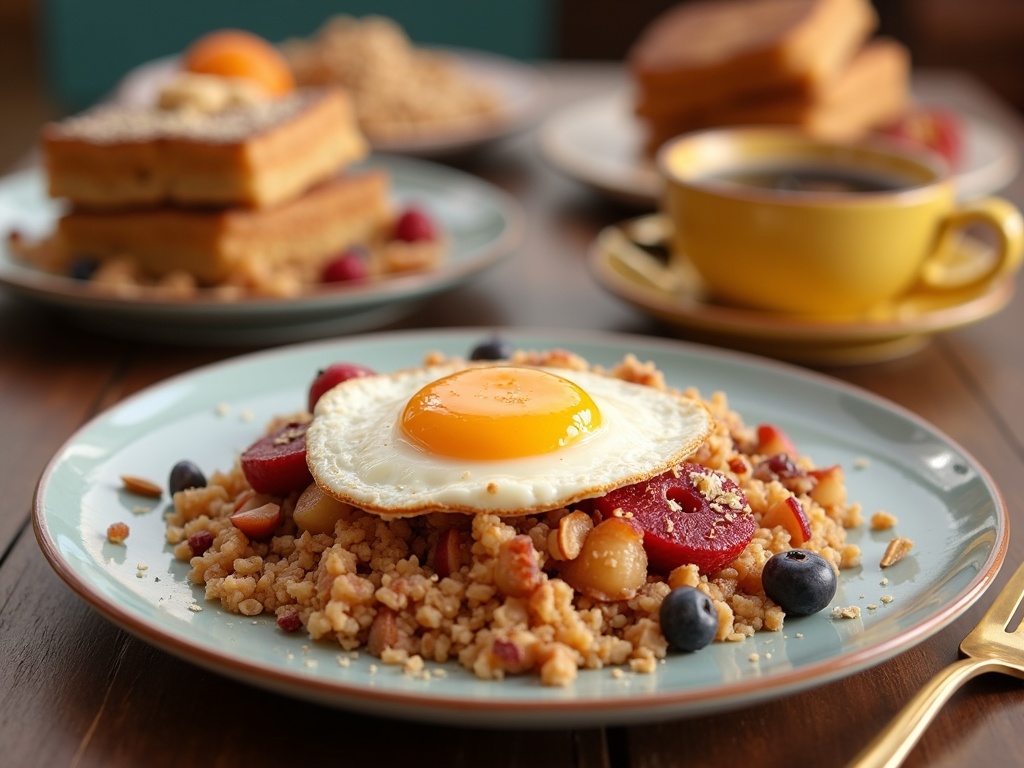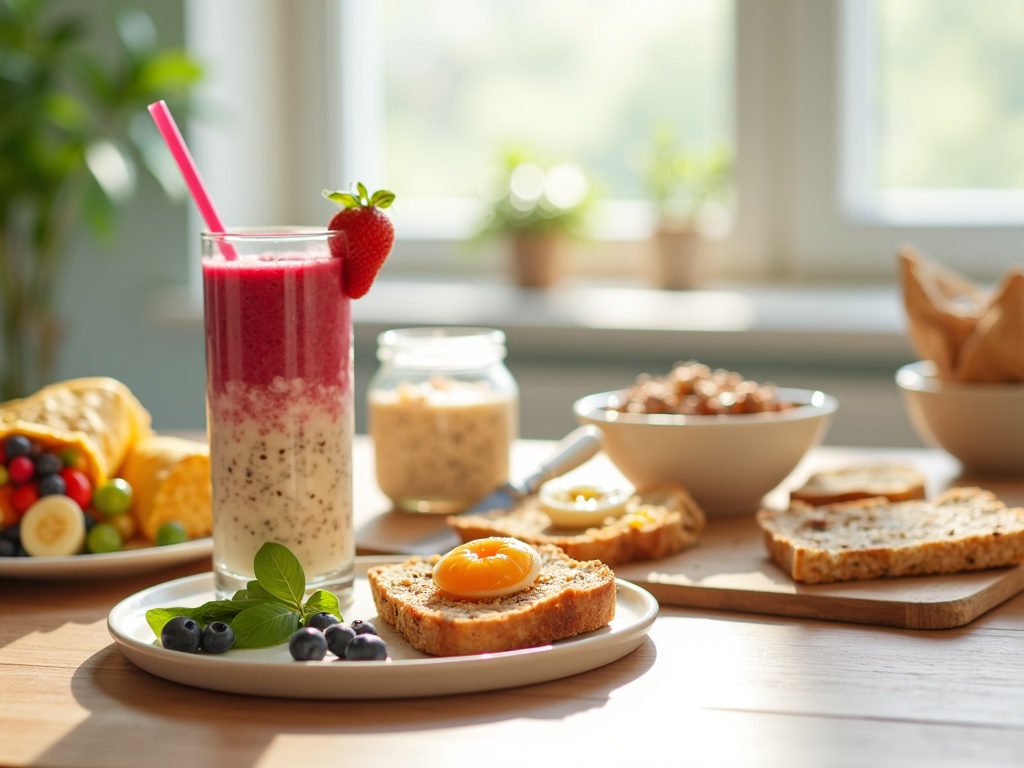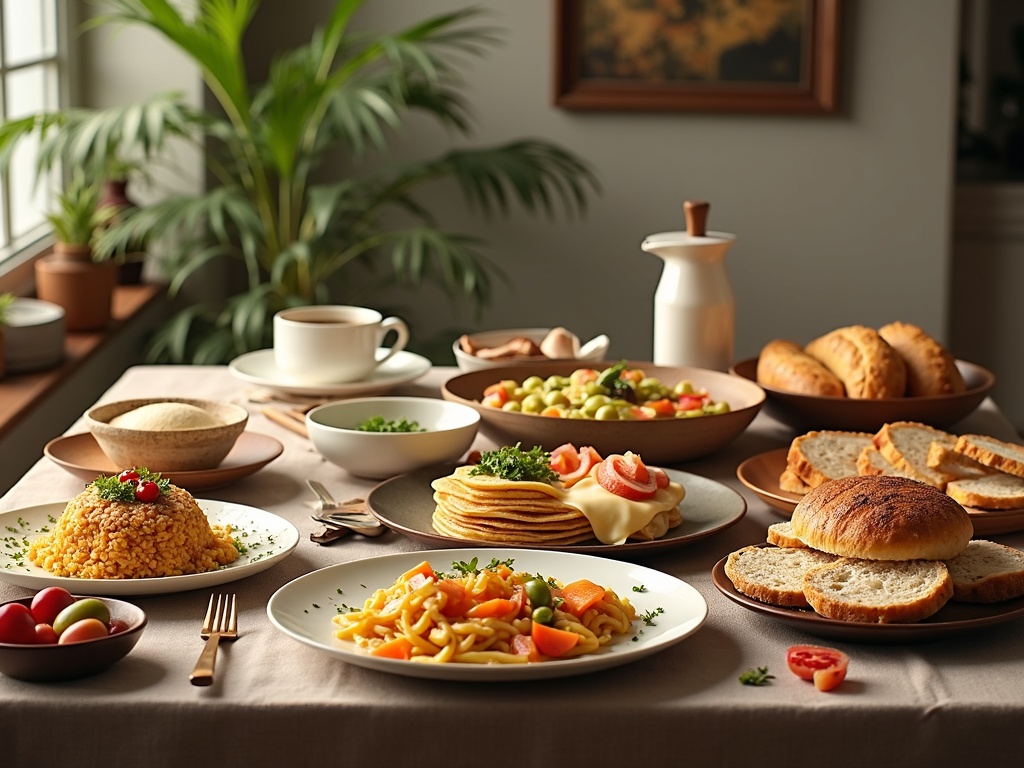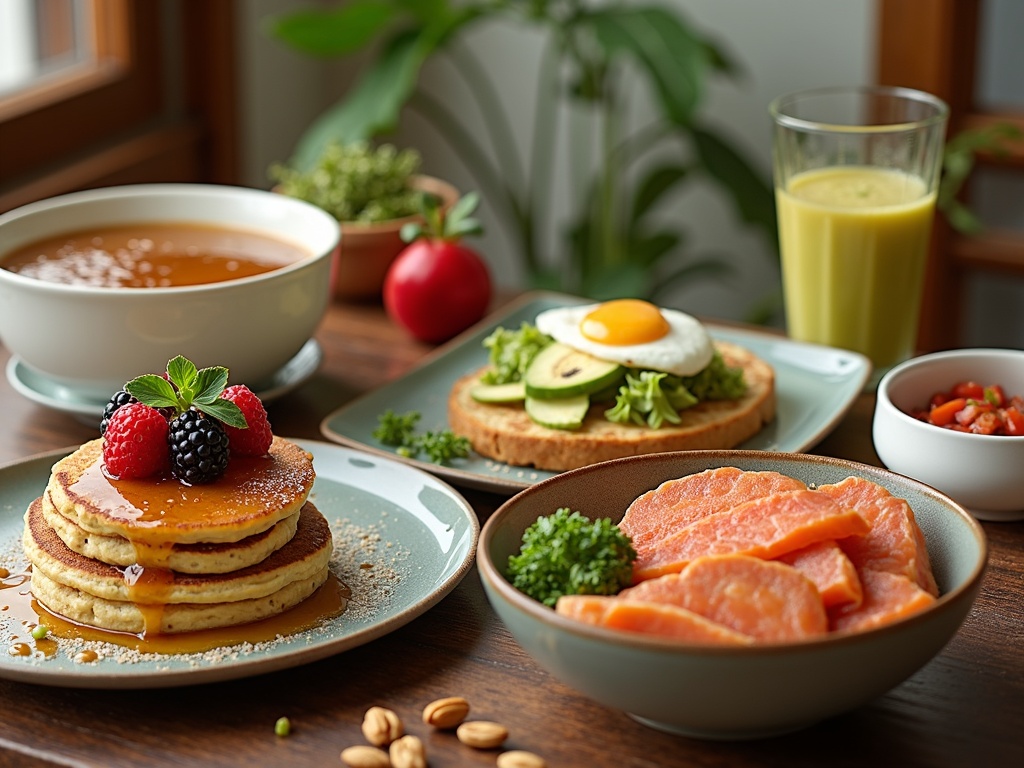Starting my day with a balanced Best breakfast has changed my health and performance, with studies confirming that consistent breakfast eaters maintain healthier weights and get a metabolic boost of up to 10%. A protein-rich morning meal sharpens focus and delivers long-lasting energy, stopping those mid-morning energy dips that often hit breakfast-skippers.
Find In This Article
Key Takeaways
- People who skip breakfast are 4.5 times more likely to struggle with weight management compared to regular breakfast eaters.
- The ideal breakfast composition includes 50% complex carbs, 25% protein, and 25% healthy fats for immediate energy and lasting satiety.
- Nutritional powerhouses for breakfast include eggs, oatmeal, Greek yogurt, berries, and avocados.
- Quick 5-minute breakfast options like smoothies, overnight oats, and pre-prepped breakfast burritos can provide nutrition on busy mornings.
- The gut-brain connection means that protein-rich, high-fiber breakfast choices can significantly improve cognitive function throughout the day.
Why Skipping Your Morning Meal Could Be Holding You Back
I’ve found that many people rush out the door without eating breakfast, not realizing the significant impact this decision has on their health and performance. The research on this topic is compelling – individuals who regularly skip breakfast are 4.5 times more likely to struggle with weight management than those who make time for a morning meal.
Starting your day with a balanced breakfast actually revs up your metabolism by up to 10% for several hours afterward. This metabolic boost helps your body burn calories more efficiently throughout the day, according to studies published in the American Journal of Clinical Nutrition. This research demonstrates that consistent breakfast eaters typically maintain healthier weights over time.
Fueling Your Body and Mind
The right breakfast composition makes all the difference in how you’ll feel until lunchtime. A protein-rich morning meal significantly improves concentration and provides sustained energy that prevents those mid-morning crashes. The American Journal of Clinical Nutrition has documented how protein at breakfast specifically supports cognitive function and helps regulate appetite hormones.
For optimal results, I aim for a breakfast with this macronutrient ratio:
- 50% complex carbohydrates (like oats or whole grain toast)
- 25% quality protein (eggs, Greek yogurt, or plant-based alternatives)
- 25% healthy fats (avocado, nuts, or seeds)
This balanced approach provides immediate energy from carbs while the protein and fat components offer lasting satiety. When I’m looking for variety, I alternate between savory oatmeal topped with an egg or french toast made with protein-rich ingredients.
For busy mornings, baked oats prepared the night before can be a game-changer. These can be customized with various protein sources and provide a grab-and-go option that still delivers nutritional benefits.
If you’re looking to try something different, ube mochi pancakes offer a delicious twist on traditional breakfast fare while still maintaining that important macronutrient balance.
For those who entertain frequently, understanding these nutritional principles can help you create breakfast catering menus that not only impress guests but support their wellbeing throughout the day.

Power-Packed Foods to Start Your Day Right
Starting my day with the right foods has completely changed my morning routine. I’ve discovered several nutritional powerhouses that keep me energized and focused until lunch. Let me share my top picks for a breakfast that packs a serious nutritional punch.
Nutritional Champions for Your Morning Meal
Eggs are my go-to breakfast protein source. Each large egg contains 6g of protein and provides a natural vitamin D boost. I love preparing them in different ways – scrambled with veggies, poached on toast, or as part of a hearty breakfast bowl. The versatility makes them perfect for both quick weekday breakfasts and leisurely weekend brunches.
Oatmeal deserves its superfood status with 4g of fiber and 6g of protein per cup serving. I’ve found significant differences between instant and rolled oats. While instant oats offer convenience, rolled oats typically contain more fiber and have a lower glycemic index. Steel-cut oats take longer to prepare but provide the most nutrients with the least processing. My favorite baked oats recipe combines rolled oats with fresh fruit and a touch of cinnamon for a delicious start to the day.
Greek yogurt has become a morning staple in my kitchen. With approximately 20g of protein per serving and beneficial probiotics, it supports both muscle maintenance and gut health. I top mine with honey and nuts for added flavor and nutrition. For a more adventurous option, try making a savory oatmeal bowl with Greek yogurt and herbs.
Berries offer incredible nutritional benefits in a small package. A cup of strawberries contains just 49 calories while providing 3g of fiber and a wealth of antioxidants. I add them to yogurt, oatmeal, or enjoy them on their own. Blueberries, raspberries, and blackberries are equally impressive alternatives that add variety to your morning menu.
Avocado has transformed my breakfast game. Half an avocado provides 2.5g of heart-healthy unsaturated fats and makes any dish more satisfying. I spread it on whole grain toast, add it to egg dishes, or include it in breakfast smoothies for creaminess. For something truly special, try topping avocado toast with a poached egg for a restaurant-quality breakfast dish at home.
Here are some quick preparation tips for these power-packed foods:
- Eggs: Boil several at once and store in the refrigerator for grab-and-go protein
- Oatmeal: Prepare overnight oats in batches for ready-to-eat breakfast
- Greek yogurt: Create parfait jars with layers of yogurt, berries, and nuts
- Berries: Freeze fresh berries when in season for year-round access
- Avocado: Store cut avocado with the pit and lemon juice to prevent browning
I’ve recently discovered ube mochi pancakes as another nutrient-dense option. The combination of antioxidant-rich purple yam and protein from mochi creates a satisfying breakfast that’s as nutritious as it is Instagram-worthy.
For busy mornings when cooking isn’t an option, I recommend exploring breakfast catering services that focus on nutritious options. Many now offer power-packed meal choices featuring these same healthy ingredients.
By incorporating these nutrient-dense foods into my morning routine, I’ve noticed improved energy levels, better concentration, and fewer mid-morning hunger pangs. The key is finding delicious ways to include them that fit your lifestyle and taste preferences.
5-Minute Breakfast Solutions for Busy Mornings
Running late but still want to eat something nutritious? I’ve got you covered with these quick breakfast options that take just minutes to prepare but deliver maximum nutrition.
Fast and Nutritious Options
Starting my day with a balanced smoothie has been a game-changer. I combine 1 cup of frozen berries, a handful of spinach, 1 tablespoon of chia seeds, and 1 cup of almond milk for a perfectly balanced drink. The protein from the seeds, fiber from the greens, and natural sugars from the fruit create an ideal macronutrient profile that keeps me full until lunch.
Overnight oats have saved me countless mornings. I mix ½ cup of rolled oats with ¾ cup of milk (dairy or plant-based), 1 tablespoon of chia seeds, and a drizzle of honey in a jar before bed. By morning, the oats have absorbed the liquid, creating a ready-to-eat breakfast that requires zero morning prep. Add fresh fruit or nuts for extra flavor and nutrients.
For something more substantial, I prepare breakfast burritos in batches. I scramble eggs with chopped bell peppers and onions, then add black beans for protein. After assembling with a sprinkle of cheese in whole wheat tortillas, I wrap each in parchment paper and freeze. A quick 90-second microwave reheat gives me a hot breakfast on busy mornings.
Nut butter toast might seem simple, but proper portioning makes all the difference. I use exactly 2 tablespoons of almond or peanut butter per slice of whole grain bread—this provides enough protein and healthy fats without excess calories. Topped with sliced banana or a sprinkle of cinnamon, it’s perfectly satisfying.
Meal prep has transformed my morning routine. Every Sunday, I prepare baked oats in muffin tins that last the entire week. For variety, I also make egg muffins with vegetables that reheat beautifully. These grab-and-go options ensure my family starts the day right, even on our busiest mornings.
For a sweet but nutritious twist, I sometimes prepare ube mochi pancakes on weekends and freeze the extras. They microwave perfectly in just 30 seconds and offer a delightful change from ordinary breakfasts.
When I’m craving something different, I prepare savory oatmeal with a soft-boiled egg and avocado. It takes just 5 minutes in the microwave but tastes like I spent much longer in the kitchen.
For a weekend treat that’s still quick, I keep French toast batter pre-mixed in the refrigerator, making it possible to enjoy this classic without the typical morning prep time.

Around the World in Morning Flavors
Traveling through different cultures via breakfast offers a delicious way to start the day. I’ve discovered that morning meals vary dramatically across the globe, with each culture bringing unique flavors and traditions to the table.
Global Breakfast Traditions
Japanese breakfasts stand out for their healthy simplicity. A typical morning meal includes steamed rice, warming miso soup, perfectly grilled fish, and tangy pickled vegetables. The balance of protein, carbohydrates, and fermented foods creates a nutritionally complete start that keeps energy levels steady throughout the morning.
Continental breakfasts, popular throughout Europe, focus on lighter fare. The key components include flaky pastries, fresh bread with jam or honey, seasonal fruits, and strong coffee or fresh juice. This style has become a hotel standard globally because of its universal appeal and ease of preparation.
Mexican breakfasts burst with bold flavors and hearty ingredients. Chilaquiles—crispy tortilla chips simmered in salsa and topped with cheese, cream, and eggs—make for a satisfying morning meal. Huevos rancheros feature fried eggs atop crispy tortillas with spicy tomato sauce and refried beans on the side. These dishes showcase how savory breakfast options can deliver both comfort and excitement.
Mediterranean breakfast choices emphasize fresh, wholesome ingredients. The morning spread typically includes:
- Whole grain breads with olive oil for dipping
- Fresh seasonal fruits and vegetables
- Briny olives and soft cheeses
- Protein-rich yogurt with honey or nuts
- Herbs like mint, oregano, and parsley for brightness
For a taste of Japanese-inspired morning innovation, ube mochi pancakes combine traditional techniques with playful flavors. The purple yam gives these pancakes their distinct color while mochi flour creates their signature chewy texture.
When hosting guests, I find that offering a variety of cultural breakfast options creates a memorable breakfast catering experience. Adding specialized items like French toast alongside international options gives everyone something to enjoy.
For a healthy twist on traditional breakfast, baked oats can be adapted to include flavors from any cuisine—try adding Mediterranean fruits and honey or Japanese matcha for cross-cultural morning creations.
The beauty of exploring global breakfast traditions lies in discovering how different cultures approach the first meal of the day—whether prioritizing nutrition, convenience, flavor, or all three simultaneously.

The Gut-Brain Connection at Breakfast
I’ve discovered that what I eat for breakfast significantly affects not just my energy levels but also my cognitive function throughout the day. The relationship between our gut and brain is complex, with nutrients from our morning meal directly impacting our mental performance and mood.
Protein and Cognitive Power
Starting my day with protein-rich foods jumpstarts my brain. Eggs, Greek yogurt, or even plant-based options like tofu scrambles provide essential amino acids that serve as building blocks for neurotransmitters – the chemical messengers in our brain. When I include at least 15-20 grams of protein in my breakfast, I notice improved focus and mental clarity that lasts until lunchtime.
The cognitive benefits of protein come from:
- Stable blood sugar levels preventing energy crashes
- Amino acids supporting neurotransmitter production
- Longer satiety reducing distracting hunger pangs
Adding protein to traditionally carb-heavy dishes like French toast by using eggs and serving with Greek yogurt creates a more brain-friendly meal than the standard version alone.
Gut Health and Mental Clarity
My digestive system and brain communicate constantly through what scientists call the gut-brain axis. Incorporating fermented foods like yogurt provides probiotics that support a healthy gut microbiome. These beneficial bacteria don’t just aid digestion – they influence cognitive function too.
The fiber component of breakfast can’t be overlooked either. When I include high-fiber foods like oats, chia seeds, or fresh berries, I provide fuel for those gut bacteria while ensuring sustained energy release. Savory oatmeal topped with vegetables adds unexpected fiber variety to my morning routine.
Fiber works in multiple ways:
- Slows carbohydrate absorption for steady energy release
- Feeds beneficial gut bacteria improving microbiome health
- Enhances feeling of fullness preventing mid-morning cravings
Interestingly, meals combining protein and fiber create the perfect storm for sustained mental performance. My go-to combination of baked oats with Greek yogurt provides this powerful duo.
Healthy fats play an equally important role in this gut-brain relationship. Avocado toast, nut butters, or omega-rich seeds like flax provide fats that support neuron function while helping control appetite throughout the morning. These fats slow digestion, providing a steady supply of nutrients to both gut and brain.
The whole grain advantage can’t be ignored either. Unlike refined carbohydrates, whole grains like quinoa, buckwheat, or whole wheat provide complex nutrients that support brain health. I’ve found that Ube mochi pancakes made with alternative flours offer a fun way to incorporate more grain diversity.
For those mornings when preparation time is limited, planning becomes essential. Many breakfast catering services now offer gut-friendly options featuring probiotics, fiber, and clean proteins – perfect for busy workdays when self-preparation isn’t feasible.
The science behind breakfast’s impact on our gut-brain connection continues to evolve, but the evidence strongly suggests that thoughtful morning meal choices set the stage for optimal cognitive performance. By balancing proteins, healthy fats, fiber, and whole grains, I’ve transformed breakfast from a mere hunger-satisfying ritual into a strategic brain-boosting opportunity.
Sources:
The American Journal of Clinical Nutrition
Nutrition Research Reviews
Preventive Medicine
Harvard Health Publishing
International Journal of Obesity

